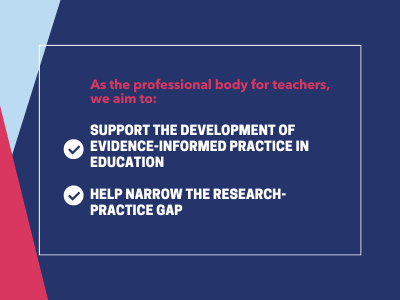As the professional body for teachers, we see it as one of our main responsibilities to support the development of evidence-informed practice in education and to help narrow the research-practice gap. Evidence-informed education has made great progress over the past years but a lot of research continues to have little practical application and teacher expertise frequently continues to be overlooked. We therefore believe that it is vital for teachers to have a voice in determining research priorities.
Classrooms are highly complex environments that arguably differ substantially from the controlled settings required for experimental research. When teachers attempt to implement research findings in their classrooms, across a range of phases, settings and subjects, they likely have a lot of pertinent questions, which can highlight important gaps in existing research and help shape future projects.

Research priority setting activities are commonly used in healthcare to help shape the research agenda by collecting and collating practitioner and patient questions. However, they are rarely used in education. We have used an adapted version of the James Lind Alliance approach (James Lind Alliance, 2021) to collaboratively identify the top fifteen research priorities relating to the use and perceived effectiveness of cognitive science research across specific subjects, phases, students, and learning contexts. To our knowledge, this is the first research priority setting activity to focus on cognitive science.
In our survey we received a total of 424 questions from practitioners about implementing findings from the cognitive sciences in their classroom. These have been refined into a list of top 15 questions that we have published in a final report (Müller and Cook, 2023).

At the Chartered College, we will be using these questions to help guide our own research work and disseminate research findings from other organisations. We are also looking to work with funders to inform new funding schemes that will allow researchers to investigate some of these questions through their work. In addition, we hope that practitioners and researchers will consider exploring some of these questions in their own research and share these findings.
On 29th June 2023 the final report was officially launched in an online webinar, where we had a lively discussion about the impact on research, policy and practice. Commenting on the report, Dr Tom Perry, Associate Professor at the University of Warwick and lead author of the EEF ‘Cognitive science in the classroom’ evidence review said:
“The EEF review identified a pressing need for research looking at the application of cognitive science in everyday classroom conditions. Teachers should be setting this research agenda to make sure it is grounded in questions of practice relating to teaching and learning across different subjects, settings and phases. I am really pleased to see the Chartered College of Teaching have provided exactly that – a really welcome development.”
Dr Tom Perry
Associate Professor
University of Warwick
Feedback since the event has been hugely promising and we hope that this important conversation will continue:
“Thank you for the opportunity to be part of the project and the webinar tonight. It really did celebrate all your hard work in producing something very special, which will undoubtedly contribute to, change and challenge our understanding of the realms of cog sci!”
Rebekah Gear
Lecturer in Primary Education
Nottingham Trent University
“I think this is a wonderful report. It presents the beginning of new opportunities of enquiry through so many questions of choice.”
Dr Marlon Moncrieffe FCCT
President ‘Elect’ (2024-26) of the British Educational Research Association (BERA)
We believe that this latest report highlights the importance of practitioners and researchers collaborating closely with the aim to determine what works best for whom and how. We look forward to seeing projects that explore any of the 15 priorities.

References
James Lind Alliance (2021) The James Lind Alliance Guidebook. Available at: [link].
Müller LM and Cook V (2023) Cognitive science in education: Teachers’ priorities for research. London: Chartered College of Teaching. Available at: [link].
